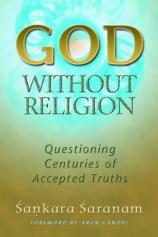Excerpt
Excerpt
God Without Religion: Questioning Centuries of Accepted Truths

Not to engage in this pursuit of ideas
is to live like ants instead of like men.
—Mortimer J. Adler
In today's complex world, many people are beginning to examine their religious beliefs in light of their longing for a more meaningful sense of God. Some individuals, while asking challenging questions about the religious beliefs handed down to them in childhood, are uncovering seedbeds of prejudice and divisiveness. Others, exploring New Age spiritual movements, are finding many to be as dogmatic as organized religions. People dissatisfied with dogma and prejudice change radically when they turn inward for direct knowledge of God.
Two steps are involved in preparing to seek direct knowledge of God. The seeker's first step is to assess his reliance on beliefs instilled in him by spiritual leaders, teachers, self-appointed gurus, or well-intentioned parents or friends. It is important to realize that the truth of an idea cannot be established based on the authority of its proponents. In fact, because of their positions some religious leaders no longer engage in actively seeking the truth. Ultimately, only when individuals are free to challenge authority does spiritual growth become possible.
The seeker's second step in preparing for a more meaningful understanding of God is to use his own intellectual faculties to evaluate his beliefs. A critical investigation of beliefs increases the willingness to take responsibility for them and also nurtures self-reliance. My work with students in recent years demonstrates that by holding beliefs up to the mirror of reason it is possible not only to have a profound understanding of God but to identify with a more expansive God.
While evaluating an organized religion handed down to them, many people stop short upon discovering the goodness of an entrenched belief system that teaches such principles as loving thy neighbor and doing God's work. However, just as machines that squeeze oranges are rated not by the health value of orange juice but by their effectiveness in producing juice, organized religions need to be evaluated in terms of their practical influence in the world rather than the ideals they preach, which existed long before the advent of religion. When viewed through this lens, it becomes clear that any good accomplished by an organized religion could have come about without the artifice of a belief system, while the faith's violent outcomes could not be mitigated by attributing them to God's will. Compared with religionists, secularists are just as worthy of emulation when they serve others, and no more culpable when they commit crimes against humanity.
Pressing beyond the positive biases of an inherited religion proves to be extremely beneficial. It unveils negative biases rooted in the seeker's religious background. It also furnishes training in individual and collective psychology, providing tools for penetrating the mysteries of the mind, including the extremes of human behavior, the need for spirituality, and the paradox of our existence as thinking creatures aware of our mortality yet aspiring to overcome it. Many great thinkers who rejected religious beliefs in an afterlife still pursued quests for immortality by striving to improve the human condition through their deeds.
But the study of only one organized religion, as helpful as it is, affords little insight into the overall impact of religion on humanity. For this, we must turn to the study of religious history—a horror story of immense proportions. An examination of religious history reveals that adherents of all faiths have consistently sought immortality at the cost of their earthly existence. Religions fostering a desire to be in a sectarian heaven do not inspire peace in their followers but instead tend to provoke injustices. Even religions that consider suicide a sinful act indoctrinate their followers with beliefs that breed inner turmoil, leading to a slow death. And sadly, the lives of "infidels" and "heretics" have historically been even more disposable in the adherents' bids for immortality.
Another awareness gleaned from religious studies is that religions routinely claim to deliver ultimate expressions of truth, often judging followers of other religions as inferior, or worse, dupes of some evil power. Ultraorthodox Jewish sects teach their adherents that the Jewish soul is superior to the souls of gentiles—dogma that many Jews accept with pride. Asian Buddhist sects for centuries approached the search for truth as if it were a competitive sport in which they excelled through one-upmanship. Fundamentalist Christians inform followers that people who do not believe in Jesus go to hell, including those who lived before him, never heard of him, or were raised to believe in another god. Similarly, Muslims tell their followers that Muhammad is the last of Allah's messengers and that Allah's final word must be heard and obeyed by all; for Islamic fundamentalists, this means the whole world must convert to Islam.
Organized religions have done much harm by professing the superiority of their followers and creating such divisive categories as true believers and godless heathens, God's righteous chosen ones and pagans, the heaven bound and hell bound, and the enlightened and unspiritual. Overtly, "us against them" distinctions attract congregants by psychologically empowering them. Covertly, they forge polarized perceptions and a distorted view of human abuses, catalyzing endless violence.
In addition, religious scriptures of all persuasions have imperiled humanity's freedom of thought and pursuit of liberty. Playing on fears of the faithful, scriptural writings exalt those who follow blindly, attack brave questioners who entertain honest doubts, and threaten dissenters with a lifetime of guilt. These writings work insidiously in the minds of the faithful who, intolerant of criticism, have gone on to incite witch hunts and religious wars, resulting in immeasurable bloodshed between religions and within them.
Historically, some of the greatest evils have emerged from displays of holiness. It was usually zealots, sure they had heard the voice of God, who fueled the fires of fear and hatred, directing them toward religious sects, ethnic groups, racial minorities, and women. Humanity is still suffering from the fanaticism of individuals influenced by canonized books espousing erroneous ideas, theologies based on superstition, unscientific cosmologies, false expectations, and unethical commands. And not surprisingly, wherever ethnic or racial minorities or women are treated as inferior, the landscape is parched with ignorance and fear. If there is a useful purpose served by religions that continue to disempower any portion of the human race, it can only be in inspiring us to prevent history from repeating itself.
God Without Religion examines the past effects of organized religion and offers more direct avenues to knowledge of God for the present and future. Chapter 1, "Worshipping by Wondering," explores our present understanding of God; this invitation to worship by wondering rather than believing opens pathways for questioning popular definitions of God while simultaneously observing the effects of belief systems on the human mind. Chapter 2, "A Bigger Picture of Human Progress," shows how we arrived at this point; challenging linear notions of progress, it introduces an ancient model of human evolution and devolution as a means for viewing both the rise of religion and humanity's intellectual and intuitive potential for universalizing God. Chapter 3, "An Alternative to Organized Religion," presents the theory of self, a nondualistic option for realizing knowledge of God; this theory portrays intuition as a verifiable, repeatable, and unbiased psychophysical science. Chapter 4, "Testing Today's Choices," weighs the merits of New Age spiritual movements, points out the pitfalls of modern approaches to Eastern spiritual traditions, and illustrates ways to expand the sense of self beyond narrow spiritual identifications.
Interspersed throughout each chapter are techniques to aid in the search for answers to spiritual questions—better answers than those furnished by organized religion. These techniques are universal, having been passed down in one form or another through mystical and philosophical disciplines. When practiced regularly, they help uncover not only better answers to spiritual questions but also better questions. And with better questions comes increased spiritual freedom on one's path to knowledge of God. Readers embarking on this path are advised to prepare for moments of discomfort following the release of one familiar belief after another. Eventually, in ceasing to identify with a narrowing belief system, your identity will grow, enlarged by the very questions you have embodied. And with your newly expanded identity you will be more knowledgeable in spiritual matters, for the more we question any aspect of life the better we come to know it.
Of the many ghosts from the past currently haunting humanity, few are as damaging as religion's outdated dogma and divisive practices. The dogma poses a barrier to intellectual and spiritual expansiveness, and the divisiveness a barrier to world peace. In vigorously challenging these walls until they crumble, we become the architects of our own thoughts, unfettered by conventional forms of worship and free at last to seek God from within.
God Without Religion: Questioning Centuries of Accepted Truths
- Genres: Christian, Philosophy
- hardcover: 320 pages
- Publisher: Pranayama Institute
- ISBN-10: 0972445013
- ISBN-13: 9780972445016


